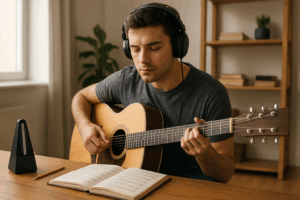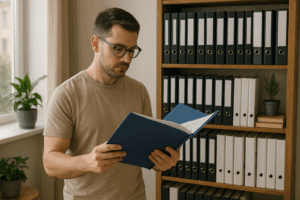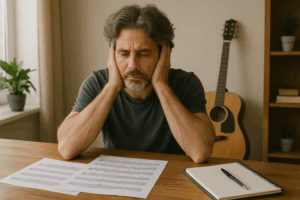As a musician, balancing music practice with other responsibilities, such as school, work, or family commitments, can be challenging. However, finding the right balance is essential for your progress and well-being. Effective time management and setting clear priorities can help you make steady improvements while maintaining a healthy and fulfilling lifestyle. In this article, we’ll explore strategies to help you balance your music practice with other life responsibilities.
1. Create a Realistic Schedule
One of the most effective ways to balance music practice with other commitments is by creating a realistic schedule. A well-structured routine allows you to allocate specific times for practice while also leaving room for other activities in your life.
How to Create a Balanced Schedule:
- Set Priorities: Start by listing all of your commitments, including school, work, family time, and other responsibilities. Identify the most important tasks and focus on them first.
- Block Out Practice Time: Set aside specific times each day or week for music practice. Treat it like any other important commitment. Even 30 minutes a day can make a big difference.
- Use a Planner or App: Use a planner, calendar, or scheduling app to organize your time. Set reminders for practice sessions and other obligations to ensure you stay on track.
By creating a schedule that works for your life, you can ensure that music practice is a regular part of your day without neglecting other responsibilities.
2. Practice Efficiently with Focused Sessions
It’s not always possible to practice for long hours every day, but that doesn’t mean you can’t make meaningful progress in shorter, more focused sessions. Efficient practice is key to balancing your time effectively.
How to Practice Efficiently:
- Set Specific Goals for Each Session: Instead of just playing through pieces, set a clear goal for each practice session. This could be improving a specific technique, memorizing a new section, or working on timing with a metronome.
- Use the Pomodoro Technique: This time management technique involves working for a set period (e.g., 25 minutes) followed by a short break. It’s an effective way to stay focused and avoid burnout during practice.
- Maximize Quality, Not Quantity: Focus on the quality of your practice, not the amount of time spent. If you’re efficient and intentional with your practice, you can achieve significant progress in a short amount of time.
By practicing efficiently, you can continue making progress even with a busy schedule.
3. Combine Music Practice with Other Activities
Finding ways to combine your music practice with other activities can help you save time and stay productive. There are several ways to integrate music into your daily life, allowing you to stay connected to your instrument without having to dedicate large blocks of time.
How to Combine Music with Other Responsibilities:
- Practice While Commuting: If you use public transport, consider listening to music, reviewing sheet music, or practicing music theory apps during your commute. This can be a productive way to stay engaged with music without disrupting your schedule.
- Integrate Music into Routine Tasks: If you do chores or other repetitive tasks, you can listen to your favorite music or even practice ear training while performing them.
- Use Technology: There are various music apps and software that allow you to practice music theory, learn songs, or improve rhythm while multitasking. These tools can be helpful for making the most of your free time.
By finding ways to incorporate music practice into your routine, you can stay consistent without sacrificing other commitments.
4. Be Flexible with Your Practice Routine
Life is unpredictable, and sometimes unexpected events or responsibilities can interfere with your planned practice time. Flexibility is key to managing your time effectively while still making progress.
How to Stay Flexible:
- Adapt to Changes in Schedule: If you miss a practice session, don’t stress. Find a way to adapt, such as practicing during a different time of day or adjusting your session length.
- Keep Practice Sessions Short: If time is limited, don’t feel the need to have lengthy practice sessions every day. A 15-minute focused practice session can be just as effective as a longer one, especially if you use the time wisely.
- Use “Makeup” Sessions: If you miss practice due to other responsibilities, try to make up for it by extending your practice time on the following day or practicing in shorter bursts throughout the day.
By staying flexible and adjusting your practice routine as needed, you can ensure that you continue to progress despite the unpredictability of life.
5. Set Boundaries and Manage Distractions
When you have multiple responsibilities, it’s easy to get distracted during practice time. Setting boundaries and minimizing distractions can help you maximize the time you do have for music practice.
How to Minimize Distractions:
- Create a Dedicated Practice Space: Set up a designated practice area free from distractions. Whether it’s a quiet room or a corner of your home, having a space dedicated to music will help you focus.
- Turn Off Notifications: During practice, turn off your phone notifications or use “Do Not Disturb” mode to avoid distractions. This will help you stay focused on your practice session.
- Set Practice Goals Beforehand: Before you begin practicing, decide what you want to accomplish during the session. Having a clear focus will help you stay on task and avoid distractions.
Managing distractions will help you make the most of your practice time and stay productive.
6. Take Care of Yourself
Balancing music practice with other responsibilities can sometimes feel overwhelming, so it’s important to prioritize self-care. Taking care of your physical and mental well-being will help you stay energized and motivated to continue your musical journey.
How to Practice Self-Care:
- Get Enough Rest: Make sure to get adequate sleep each night to stay sharp and focused during practice. Rest is essential for both physical and mental recovery.
- Eat Well and Stay Hydrated: Proper nutrition and hydration are important for maintaining energy and focus throughout the day. Eating balanced meals will also keep your brain and body in good condition for practicing.
- Exercise Regularly: Physical activity boosts mood and energy levels, which can improve your overall productivity and focus during music practice.
By taking care of yourself, you’ll be better equipped to handle the demands of music practice and other life responsibilities.



